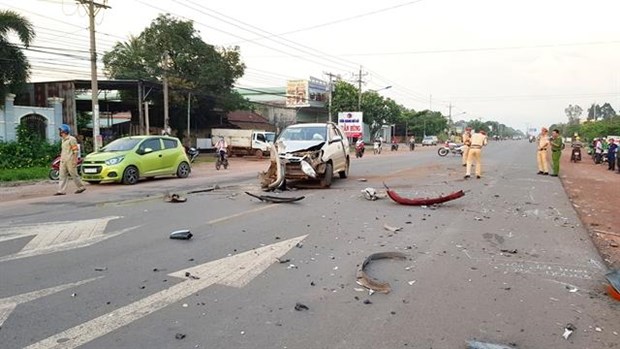Drink, drugs are main causes of traffic accidents: Deputy PM
Thứ Năm, 17/10/2019, 17:14
Alcohol and drugs are blamed for many serious traffic accidents this year, said Deputy Prime Minister and Chairman of the National Traffic Safety Committee Truong Hoa Binh on October 16.
 |
| Alcohol and drugs are blamed for many serious traffic accidents this year. (Photo: VNA) |
Alcohol and drugs are blamed for many serious traffic accidents this year, said Deputy Prime Minister and Chairman of the National Traffic Safety Committee Truong Hoa Binh on October 16.
Speaking at a national teleconference on traffic safety held by the National Traffic Safety Committee, Binh said although with the involvement the entire political system, traffic accidents had decreased in terms of incidents, deaths and injuries, the situation was still serious.In addition, violations of transport business conditions and overloading still occur in many places, and traffic congestion in large cities is on the rise, he said.
The Deputy PM asked relevant authorities to analyse weaknesses in the transport sector and identify shortcomings in order to improve road safety.
Khuat Viet Hung, deputy head of National Traffic Safety Committee, said in the first nine months of the year, there were 12,600 traffic accidents nationwide, killing more than 5,600 people, and injuring more than 9,600 people.
Compared to the same period in 2018, the number of traffic accidents decreased by nearly 600, the number of deaths fell by 353, the number of injured people dropped by 700.
In 7,319 accidents that were studied, more than 22 percent of drivers were violating lanes and road sections; nearly 2 percent of drivers used alcohol; more than 35 percent were caused by violations of road sign regulations, drivers with no valid licence, vehicle safety, traffic works and other causes, he said.
To reduce accidents in the last months of the year, Hung said the National Traffic Safety Committee will direct agencies at all levels to amend and supplement legal documents; improve infrastructure, strictly manage the quality of infrastructure maintenance; and enhance the quality of training and testing of vehicles.
"Patrolling and handling of violations need to be done substantially,” Hung suggested.
“The authorities need to strictly handle acts of driving under the influence of alcohol and drugs, violations of helmet wearing regulations, not wearing seat belts when riding in cars and using phones when driving," he added.
VNA

